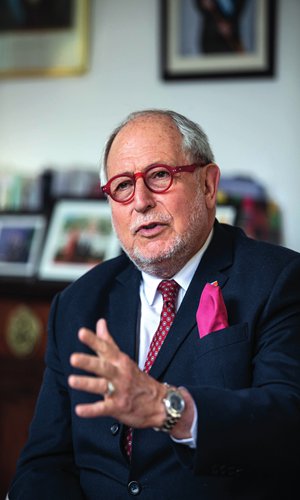IN-DEPTH / DIPLOMATIC CHANNEL
Argentine Ambassador strengthens relations with China

Argentine Ambassador to China Diego Ramiro Guelar. Photo: Li Hao/GT
Editor's Note:
The first thing that comes to Chinese people's minds when thinking about Argentina is soccer and Lionel Messi. But there is a lot more to the country than that.
After establishing diplomatic relations in 1972, China and Argentina have seen increasing exchanges. China is Argentina's second largest trading partner and an important source of foreign investment. The two countries enjoy a sound momentum of economic and trade relations with broad prospects for cooperation under the Belt and Road Initiative. Although there are differences in distance and culture, the two sides have seen closer ties on all levels.
The current Argentine Ambassador to China Diego Ramiro Guelar (Guelar) has been an active figure in deepening the bilateral ties through culture, tourism and investment. The Global Times (GT) sat with him to talk about the latest concerns regarding the two countries.
GT: In 2016, you said to media that Argentina should work for visa exemption for Chinese tourists there, and you said that you are confident to implement the visa-free policy within five years. Can it be achieved during your tenure?
Guelar: We advanced a lot. When I arrived, our visa was only for 90 days and now our reciprocal visas are for ten years. In the beginning, you even had to use a VPN to get access to our online visa application platform. Our embassy even sent a message to the immigration service to warn them about this. It was a major problem in the last 30 to 40 days and now it is okay. We also have the visa waiver policy towards the electronic visa for the Chinese people who have a US or European visa scheme. Now there has been a clear upgrade in terms of the visa policy. We have doubled the number of Chinese tourists within almost three years since I came here. In the future, we are expecting a non-visa policy and we are working in that direction.
GT: In recent years, there have been some anti-dumping measures taking place against Chinese products to Argentina in order to reverse the trade deficit with China. Analysts said that China and Argentina's industrial structures are highly complementary, and the trade deficit is the embodiment of this difference in industrial structure. What is your view?
Guelar: First, the anti-dumping procedures are not in regards to the goal of reducing our deficit. Both China and Argentina are members of the WTO and we both are accomplishing those rules. China and Argentina are strong defenders of multilateralism, fair trade, and avoid protectionism and unilateralism. The deficit is very important and it has amounted to over $7 billion last year. I don't have any doubt that the deficit is not related to the excess of imported products from China to Argentina. Instead, it is our own lacking capability to produce the goods the Chinese market needs and expects from Argentina. That is our great challenge. The problem is that we have been isolated for decades and that we had been too concentrated on the domestic and neighboring markets. We have to organize ourselves to produce more and better products to the Chinese market.
GT: As an important trading partner of Latin America, China has signed free-trade agreements with Peru, Chile and Costa Rica. Despite the significant trade volume between China and Argentina, the free-trade agreement is not there. What are the major issues that need to be tackled first in order to sign the free-trade agreement between the two sides?
Guelar: The first issue is that we have to decide together with Brazil, Paraguay and Uruguay because we all belong to the trade association Mercosur. We have some problems to solve. There is a major debate about whether it is convenient or not to have the free-trade agreement. Personally, I have no doubt that the final goal is to have all the markets related through a free-trade agreement. This is something we have to put forward, but there is a political issue as well, which means we need to gather different parties and organizations together for an agreement.
GT: In recent years, China's exchanges with Latin American countries have become increasingly closer and the fields of investment have broadened. The policy support for Chinese enterprises varies from country to country. What preferential policies can Argentina offer to Chinese enterprises that are different from those of other countries?
Guelar: We are not offering special policy or privileges but finally we have to call for investment. In terms of investment, it is as good from China, US or any European countries. But the really important issue regarding the free flow of capital is to recognize the national treatment and international treatment. In that case, Argentina is very clear. If a Chinese company makes an investment that means hiring people and paying taxes, the company will immediately become an Argentine company, which means it will be treated the same as the local Argentine companies. Companies such as Huawei, COFCO and ICBC that have businesses in Argentina are becoming immediately local, not a foreign company. So there is no discrimination against foreign companies in Argentina. In the case of Argentina, foreign companies are very comfortable with being there. Of course, in the world of prejudices, we also have some and we have to resolve them. For example, the free-trade agreement is still a debate. But it is clear that it is going to be more open for Argentina.
